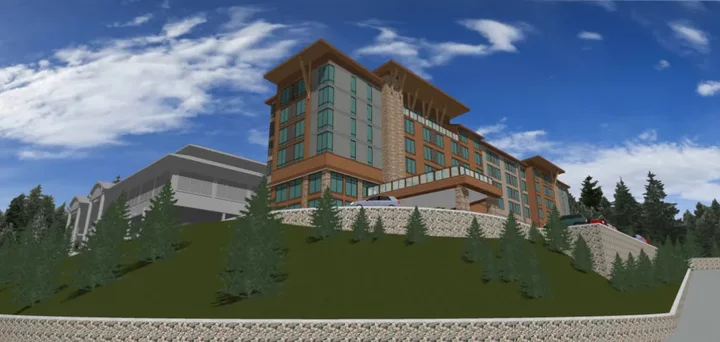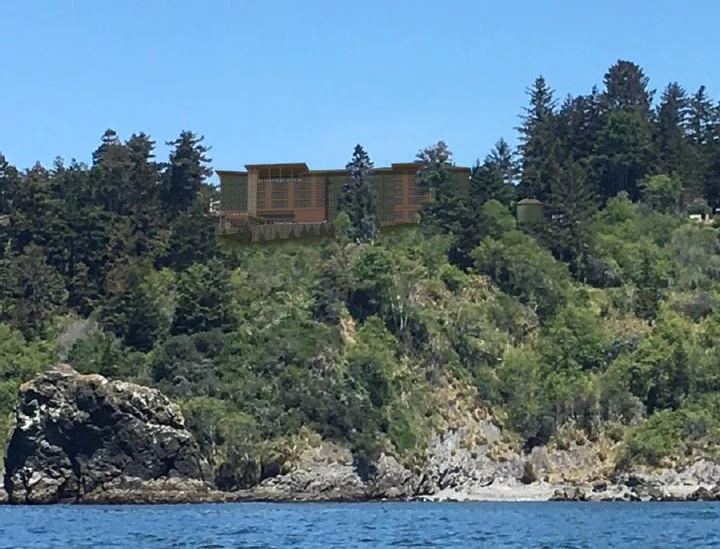Representación de un propuesto hotel Hyatt de cinco pisos y 100 habitaciones propuesto en el acantilado adyacente al Cher-Ae Heights Casino, con vista al Pacífico. | Imagen vía Comisión Costera de California.
###
Los planes de larga data de la Trinidad Rancheria para construir un hotel Hyatt de cinco pisos y 100 habitaciones en el acantilado sobre Scenic Drive recibieron un golpe ayer por un fallo provisional de un tribunal de apelaciones de California, que dice que no hay suficiente evidencia de que el hotel tendría servicios adecuados de protección contra incendios.
Si el fallo provisional se finaliza, revertiría una determinación condicional realizada por la Comisión Costera de California en agosto de 2019. Con una estrecha votación de 6-5, la comisión estuvo de acuerdo con la Oficina Federal de Asuntos Indígenas (BIA), que encontró que el proyecto era consistente con la Ley Costera del estado. Sin embargo, la Comisión Costera dijo que la tribu tendría que encontrar un suministro de agua adecuado, lo que había resultado difícil para la tribu.
Con el fallo provisional de ayer, el juez Mark B. Simons, de la Corte de Apelaciones del 1er Distrito de California, programó argumentos orales para el 21 de noviembre. Si la Comisión Costera u otras partes, incluida la Trinidad Rancheria, desean argumentar en contra de esta opinión preliminar, se les darán 10 minutos cada uno en esa fecha.
El recurso de la decisión de 2019 de la Comisión Costera fue presentado por la Alianza Humboldt para una Planificación Responsable (HARP), un grupo sin fines de lucro enfocado en problemas de desarrollo en el área de Trinidad-Westhaven. Un tribunal de primera instancia denegó la petición de HARP, pero el grupo apeló en cinco argumentos diferentes, desafiando la lógica y fundamentos de las acciones de la comisión en una variedad de temas, incluido el aspecto del hotel, y si encajaría con sus alrededores escénicos.
Una simulación visual del hotel propuesto en la Trinidad Rancheria desde el agua debajo. | Imagen vía Comisión Costera de California.
El juez Simons rechaza todos los argumentos salvo uno en su opinión provisional: aquel que dice que no hay evidencia sustancial para respaldar un hallazgo de servicios adecuados de protección contra incendios para el hotel propuesto.
“[E]stamos de acuerdo con HARP en que no hay evidencia suficiente para respaldar ese hallazgo,” dice el juez Simons.
During the 2019 hearing, Coastal Commission staff pointed to cooperative agreements with surrounding fire service providers, including the Trinidad and Westhaven volunteer fire departments and CalFire, which has a station nearby. But staff also noted that the closest hook and ladder equipment was in Arcata.
The services closer to the proposed hotel, including those from the nearby CalFire station, are equipped to handle residential fires but not blazes in a multi-story hotel.
Rancheria CEO Jacque Hostler-Carmesin “acknowledged that the closest ladder truck was in Arcata,” Simons notes, but she then pushed back on the commission — and on local Commissioner Mike Wilson, in particular — arguing that the commission was “really questioning the tribe’s integrity.”
Hostler-Carmesin added, “for insurance reasons, we have fire hydrants, we have fire protection … we do everything right … and the building will have sprinkler systems, all of that.”
Wilson and the rest of the commission backed off, but Simons observes that, “The revised findings made no mention of fire protection services.” His tentative ruling says that because HARP raised its concerns in a timely manner “and because the adequacy of fire protection services is an important public safety issue, we exercise our discretion to consider it here.”
Ultimately, his tentative ruling comes down to a sort of technicality. He says that the commission’s finding that there are adequate fire protection services is reasonable, “But we further conclude that there is insufficient evidence to support that finding.”
Simons notes that the Tribe only said it has “preliminary agreements, verbally with CalFire” but also acknowledged that “[w]e haven’t circled back to CalFire.”
“Although we do not doubt the sincerity of the Tribe’s representations or intentions, this vague assertion of a preliminary, verbal agreement with CalFire simply does not constitute substantial evidence of adequate fire protection services,” Simons writes.
The Outpost reached out to HARP, the Coastal Commission and the Trinidad Rancheria earlier today. A member of HARP did not respond to our email before this post was published.
Reached by phone, Hostler-Carmesin said she had no idea that anything like this had been filed in court. She declined to comment any further on the record, saying she’ll send us an official statement in the near future.
The Coastal Commission did not immediately provide responses to an emailed list of questions, though spokesperson Joshua Smith said he’ll try to get replies by early next week.
We will report more on this issue once we hear back from the above-mentioned folks.
###
###
PREVIOUSLY
- Take a Look at the Big Proposed Trinidad Casino Hotel; Concerned Community Members Schedule Meeting to Gin Up Public Comment
- Coastal Commission Gives Green Light to 100-Room Hotel on Trinidad Rancheria … as Long as the Tribe Can Find a Reliable Water Supply
- That Coastal Commission Meeting Was a Confusing Mess. Did They Even Mean to Advance the Hotel Project?
- The City of Trinidad and the Trinidad Rancheria Are at Odds Again Over the Water Supply for the Tribe’s Hotel Project
- City Pumps Brakes on Trinidad Rancheria’s Request for Water; Will Draft Policy Before Continuing Formal Negotiations Over New Hotel Development
- Trinidad Rancheria Asks for Pipeline Extension to Get Water Via Humboldt Bay Municipal Water District


CLICK TO MANAGE